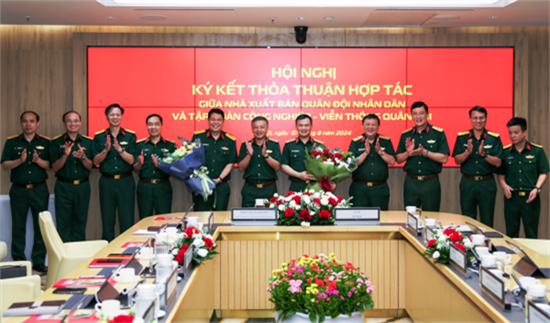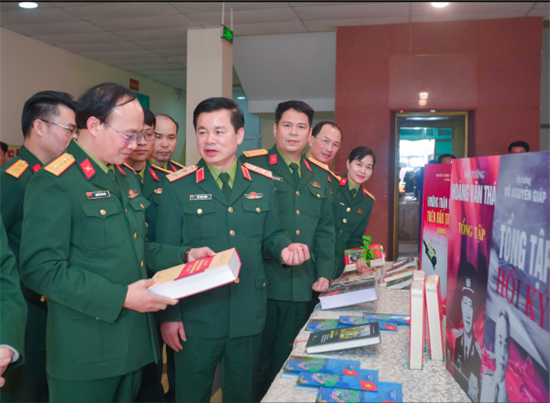People’s Army Publishing House - 75 years of accompanying military knowledge, firmly entering the new era
Publishing plays an important role as a sharp ideological and cultural weapon of the Communist Party of Vietnam (CPV) and the Vietnam People’s Army (VPA). Over the past 75 years, the People’s Army Publishing House (hereafter referred to as the Publishing House) has always excelled in its tasks, deserving its role as an agency of the Central Military Commission and Ministry of National Defence specialising in military publishing under the direct management of the General Department of Politics (GDP). Through its activities, the Publishing House has greatly contributed to the CPV and VPA’s political and military tasks, broadening troops’ military knowledge, laying the groundwork for building a revolutionary, regular, elite, and gradually modern VPA.
On 11 July 1950, President Ho Chi Minh issued Decree 121/SL on the organisation of the General Command of the Vietnam National Army and Militia. Article 3 of the Decree identified the National Defence Publishing House as one of the first five agencies within the GDP, on the basis of merging National Defence Publishing House with Guerrilla Publishing House.
 |
| The signing of a cooperation agreement between the People’s Army Publishing House and the Military Industry and Telecoms Group |
Following the 2nd National Party Congress in 1951, the name “People’s Army Publishing House” was officially adopted to be relevant to the new title of the Vietnam National Army and Militia - the VPA. To meet the aspirations of generations of cadres and employees of the Publishing House, Director of the GDP issued Decision 580/QD-CT, dated 18 September 1999, recognising 11 July 1950 as the Traditional Day of the Publishing House. History of the Publishing House is inseparable from the process of development, combat, and maturity of the people’s armed forces under the CPV’s leadership. The Publishing House has always closely followed and effectively served the Party’s political and military tasks in various stages of the revolution and the VPA’s development.
In the resistance war against French colonialists, despite facing extreme hardships and shortages, the Publishing House succeeded in releasing nearly 300 books. Most of these were thin volumes printed with rudimentary equipment, using low-grade paper and simple layouts. Yet, they were regarded as some of the most important publications for the VPA at that time, playing a crucial role in political and ideological education and combat training for troops.
As Vietnam entered the resistance war against American imperialists, the Publishing House built upon its earlier experience to increase the quantity and quality of its books. Notably, this included major works by President Ho Chi Minh and his comrades, such as Le Duan, Truong Chinh, Pham Van Dong, Vo Nguyen Giap, Nguyen Chi Thanh, and Van Tien Dung. With practical and beneficial content, along with formats suitable for combat operations (such as small-sized books and portable libraries that fit in backpacks); these publications accompanied soldiers across all battlefields. They played a crucial role in disseminating and guiding action of troops and citizens across the country, successfully implementing the CPV’s political and military guidelines.
Since the complete reunification of the country, especially during nearly 40 years of Doi Moi, the Publishing House has prioritised publishing works that affirm the revolutionary and scientific nature of Marxism - Leninism and Ho Chi Minh Thought, upholding the path to socialism and the Party’s leading role in the cause of national construction and defence. By firmly grasping and concentrating on military topics, it has released a large number of highly valuable works. These include war summaries, military history, memoirs, and theses by generals and scholars. Concurrently, it has collaborated with agencies and units throughout the VPA to successfully develop book series serving the cause of strengthening all-people national defence and building a revolutionary, regular, elite, and gradually modern VPA in the new era.
In all historical periods, the books published by the Publishing House have consistently maintained a strong political orientation, offering rich and diverse content with increasingly attractive and aesthetically pleasing designs. These publications are not only a treasure trove of knowledge but also serve as active and effective tools on ideological, political, and cultural fronts, contributing to firmly protecting the CPV’s ideological foundation. Furthermore, they represent a valuable legacy of military cultural knowledge to be passed on future generations.
With its outstanding accomplishments, the Publishing House has received numerous prestigious awards. Notably, on the occasion of the 75th Anniversary of its Traditional Day (11 July 1950 - 11 July 2025), it will proudly be awarded Third-Class Fatherland Protection Order. That is a well-deserved recognition of the contributions made by generations of cadres, editors, employees, and soldiers of the Publishing House. That also serves as a powerful spiritual motivation for the Publishing House to continue its development in the new era.
As the nation enters a new era of development, military publishing, despite advantages, is confronted with considerable difficulties and challenges. This demands rapid innovation and development in its operational models, publishing methods, and technology application. The robust growth of published works in the market has led to a wide array of diverse publications, making the competition among publishing houses an inevitability. Concurrently, hostile forces’ sabotage efforts on ideological and theoretical fronts are increasingly intense and sophisticated, imposing ever-higher demands on military publishing. In this context, the Publishing House has identified several fundamental orientations as follows.
First, continuing to deeply, fully, and systematically grasp the Party’s views on the position, role, unique nature, and increasingly high demands of publishing work in the new situation. It must be clearly understood that publishing is a vital component of the Party’s ideological and cultural work, serving as a sharp weapon on ideological and theoretical fronts to safeguard the CPV’s ideological foundation and refute hostile and erroneous viewpoints. Hence, the Publishing House will consistently focus on building, nurturing, and developing a contingent of qualified cadres and editors who are passionate, dedicated, highly skilled, and capable of synthesising, processing, and creating knowledge with high scientific content and profound ideological value.
 |
| Lt. Gen. Do Xuan Tung, Deputy Director of the GDP, during his visit to the People’s Army Publishing House |
Second, proactively advising the Central Military Commission, the Ministry of National Defence, and the GDP on appropriate guidelines, mechanisms, and policies to invest in the Publishing House’s development towards professionalism, modernity, and synchronicity. This aims to solidify its position as the leading publishing agency within the armed forces, playing a guiding role in military publishing. Emphasis will be placed on building an advanced infrastructure system for printing, distribution, and archival technology, innovating organisational models and modern management to adapt to an open and comprehensively competitive publishing environment in the digital age. While maintaining the strength in traditional printed books with their long-term archival value and intellectual depth, the Publishing House is also committed to intensifying its electronic publishing efforts, enhancing accessibility, convenience, and two-way interaction with readers.
Third, adopting synchronised solutions to raise the overall quality of publications, paying due regard to maintaining a balance between content depth, political accuracy, and reader engagement, especially in today’s fiercely competitive information landscape. Each book or published work must clearly reflect ideological stance and serve as a guide for public opinion, contributing to educating revolutionary individuals, especially younger cadres and soldiers. At the same time, it is absolutely vital to prevent any errors, especially in terms of politics. In its operations, the Publishing House will remain steadfast in the principle of not pursuing profits by all means; however, it will still ensure economic efficiency, professional management, and sustainable development through autonomy and accountability.
Fourth, remaining steadfast in the objective of building a publication system that not only carries combativeness, but also preserves cultural, scientific, historical, and defence - security values to serve the cause of national protection and development. Leveraging its vast existing data, the Publishing House will proactively digitise and develop an intelligent storage, integration, classification, and management system, progressively contributing to the big data systems of the VPA and the nation. This is not only an essential requirement in the modernisation process, but also a political responsibility in safeguarding and promoting the nation’s cultural heritage and military history. Each publication must serve as a source of “soft power” in building “people’s hearts and minds” posture, reinforcing social trust, spreading revolutionary ideals, and cultivating humanitarian values. It aims to “spiritually arm” cadres, soldiers, and the people, especially the younger generation, via the truth, the good, and the beautiful, enabling them to effectively identify and counter hostile viewpoints, thereby defending the CPV’s ideological foundation in today’s complex environment.
Fifth, continuing to streamline the organisational structure towards efficiency, specialisation, and responsiveness to the increasing demands of digital transformation and administrative reform within the VPA. Guided by the principle of “fewer layers, greater efficiency”, the Publishing House will refine its organisational structure into a model that is open, inter-connected, and integrated. Every affiliate will have clear functions, specific tasks, and flexible, effective cooperation mechanisms. Simultaneously, due regard will be paid to developing modern working regulations, applying technology to management and operations, and optimising time, resources, and work quality. Collaboration with research institutions, universities, scientific organisations, and major data hubs both inside and outside the VPA will be fostered to form a modern, multi-platform, multi-value publishing ecosystem. Notably, the Publishing House will stimulate an innovative environment for young personnel, fully utilising their strengths in technology, media, and creativity. Doing so will enable the Publishing House to become a publishing - ideological - technological model in the digital age.
Promoting its 75-year-long tradition of accompanying military knowledge, with political willpower, innovative thinking, and great determination for transformation, the Publishing House will continue to affirm its role as a pioneering force on ideological and theoretical fronts. It will remain committed to improving its task performance, modernising its operations, and safeguarding its standing as a pillar of knowledge and a “cultural fortress” in the nation’s era of rise.
Sr. Col., Writer PHAM VAN TRUONG, MA
Director and Editor-in-Chief of the Publishing House